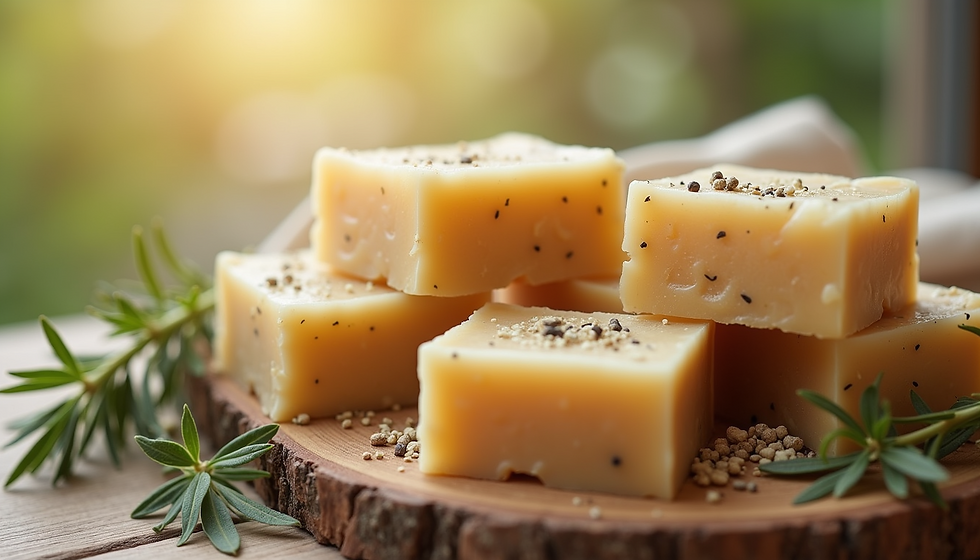How to Choose the Best Soap for Your Skin Type
- DeShawn Marie

- Jun 27, 2025
- 4 min read
Finding the right soap for your skin can feel overwhelming, especially with all the choices available. Your skin type is a crucial factor in determining which soap will work best for you. Using the wrong soap may lead to dryness, irritation, or breakouts. This guide will help you understand the different types of soap and how to choose the best one for your unique skin needs.
Understanding Your Skin Type
Before selecting soap, it’s essential to know your skin type. Skin can generally be classified into five categories: normal, oily, dry, sensitive, and combination. Each category has specific characteristics and requires different types of soap for optimal health and hydration.
Normal Skin: This skin type has a good balance of moisture and oil. Individuals with normal skin can use a variety of soaps, including gentle cleansers and moisturizing options.
Oily Skin: Characterized by excess oil and shine, oily skin often leads to enlarged pores and acne. Look for soaps containing salicylic acid or tea tree oil for extra cleansing.
Dry Skin: If your skin feels tight, flaky, or rough, it’s likely dry. Moisturizing soaps with glycerin or natural oils are best for this skin type to help retain moisture.
Sensitive Skin: Sensitive skin is prone to redness, irritation, and rashes. Use fragrance-free, hypoallergenic soaps designed specifically for sensitive skin to minimize reactions.
Combination Skin: This skin type features both oily and dry areas, often requiring a balanced soap that won’t exacerbate either condition.
Soap for Skin Concerns
Once you understand your skin type, you should consider any specific skin concerns or conditions you might have. For instance:
Acne-Prone Skin: Look for soaps with antibacterial properties or ingredients like charcoal, which can draw impurities from the skin.
Eczema or Psoriasis: Creamy, soap-free cleansers with soothing ingredients like oat extract can be beneficial.
Aging Skin: Soaps rich in antioxidants or anti-aging ingredients can help improve skin texture and elasticity.
Be vigilant about what ingredients you’re taking into your body through your skin. Always read the labels and select products that align with your preferences and needs.

Ingredients to Look For
Next, let's delve into the specific ingredients that you should seek out or avoid based on your skin type:
1. Natural Ingredients
Natural ingredients can provide a gentler alternative to synthetic ones. Look for:
Shea Butter: Excellent for moisturizing dry skin. Our entire soap collection has shea butter as an ingredient.
Coconut Oil: Has antibacterial properties and is great for all skin types. Another ingredient that is used in our entire collection of handmade soap.
Aloe Vera: Soothing and hydrating, perfect for sensitive skin.
These ingredients not only nourish the skin but also represent a more sustainable choice for the environment.
2. Avoid Harsh Chemicals
Some soaps contain sulfates, parabens, or artificial fragrances that can irritate the skin. Check for:
Sulfates: Known to strip natural oils from the skin; avoid if you have dry or sensitive skin.
Parabens: Used as preservatives but can be irritating for some skin types.
Chemicals: These can cause allergic reactions for sensitive skin types.
Understanding labels can make a significant difference in your skin's health.
Handmade Soap vs. Commercial Soap
When choosing soap, you may wonder about the benefits of handmade soap compared to commercially produced options. Handmade soap often contains natural oils and ingredients, resulting in a gentler formula that retains skin-moisturizing properties. Additionally, these soaps tend to be free from synthetic additives and preservatives.
On the other hand, commercial soaps can be mass-produced with less care for ingredient quality. While they might be cheaper, they often contain fillers and harsh chemicals that can dry out or irritate the skin. Therefore, investing in quality soaps, like those from DeShawn Marie Bath & Beauty, can lead to healthier skin in the long run.
Practical Tips for Soap Selection
As you narrow down your soap options, follow these practical tips:
Patch Test: Always conduct a patch test when trying a new soap. Apply a small amount on a discreet area of your skin to check for any adverse reactions.
Consider Seasonality: Your skin’s needs may change with the seasons. For instance, winter may require more moisturizing soaps, while summer may benefit from lighter, refreshing options.
Read Reviews: Take time to read customer reviews to gauge the effectiveness of a soap for your skin type. Look for testimonials from people with similar skin concerns.
Selecting the right soap can change your skincare routine dramatically. Making an informed choice is key to achieving the skin health you desire.
Final Thoughts on Choosing Soap for Your Skin Type
Finding the perfect soap tailored to your unique skin needs doesn’t have to be a chore. By understanding your skin type, being mindful of ingredients, and considering the option of handmade soap, you can confidently choose a product that promotes healthier, happier skin. Remember that the journey to healthy skin is personal, and it may take time to find your best match.
Take the time to explore and experiment with different soaps until you discover the right one for you. Happy cleansing!












Comments